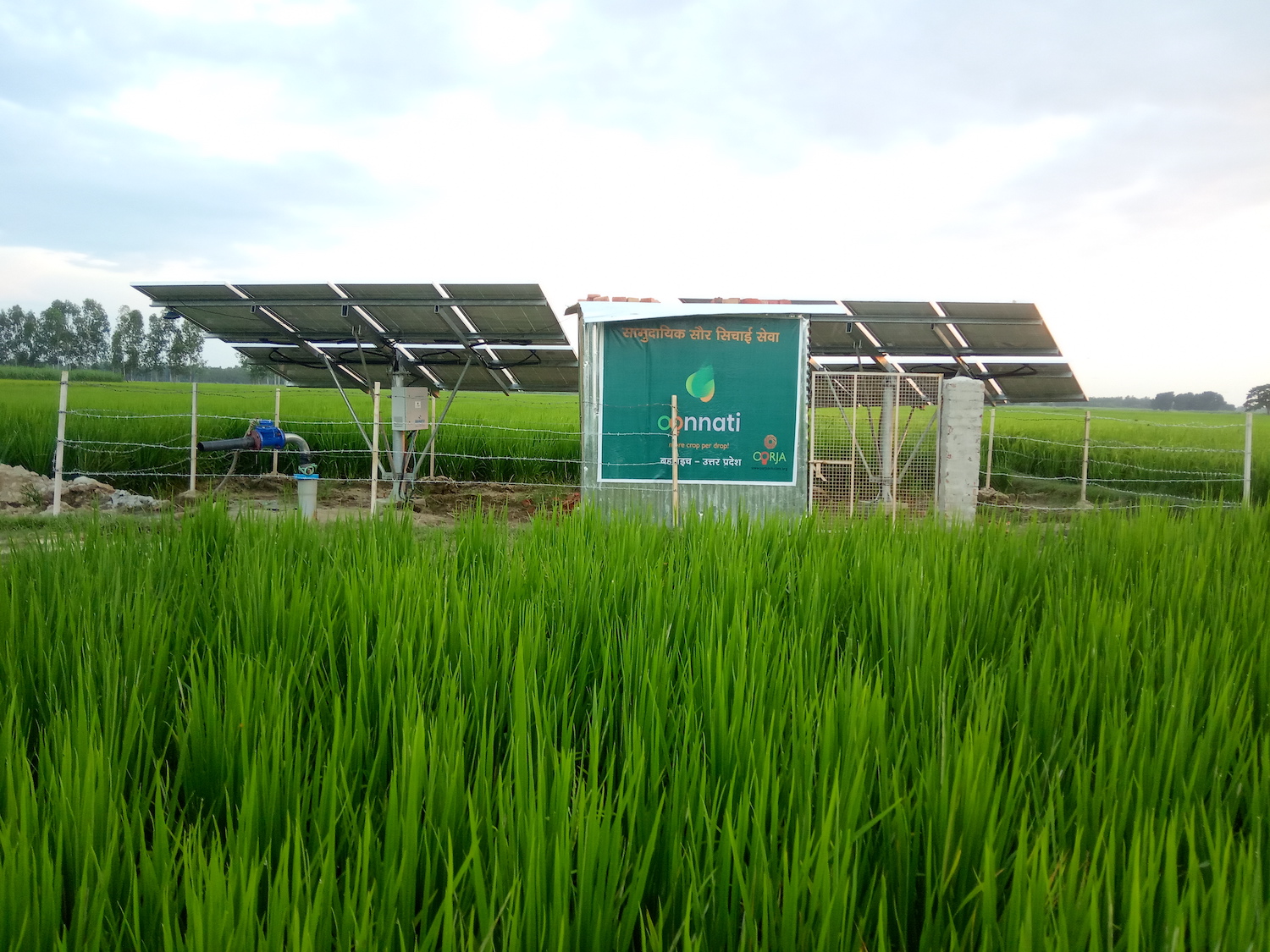
(Image: Founded by young entrepreneurs, Oorja provides solar-powered water pumps that allow smallholder farmers to transition away from using diesel for irrigation.)
In rural India, smallholder farmers often struggle to earn a living. They are also largely dependent on highly polluting diesel fuel, the dominant source of energy across northern and eastern India, responsible for 5 percent of the country’s carbon emissions. Diesel fuel is also costly: Farmers across the country spend $4 billion per year to operate 9 million diesel-powered water pumps for irrigation, presenting a huge financial burden for farmers, most of whom cannot afford to invest in alternatives.
Enter Oorja, an innovative, mission-driven social enterprise based in New Delhi that provides integrated energy solutions to replace diesel engines used along the agricultural value chain. Oorja installs, operates and maintains solar water pumps, which are each shared by 15 to 20 smallholder farmers. The water pumped is metered and sold by volume through a service called Oonnati, achieving 20 percent cost savings compared to diesel-powered irrigation.
Over 180 users have adopted Oorja’s clean energy services and moved away from diesel fuel without any upfront cost for technology acquisition. Benefits extend beyond the cost savings, said Dr. Clementine Chambon, co-founder and chief technology officer for Oorja. Because farmers can irrigate their land throughout the year using Oorja’s system, agricultural productivity has increased by 6 to 15 percent for participating farmers — and income shot up by 30 percent. Further, a clever “cluster" model for operations, in which each group of farmers is serviced by a multi-skilled field team that is hired locally, generates additional local employment.
Given its sustainability bona fides, it’s no wonder that Oorja has garnered a number of accolades, including the $US100,000 Grand Prize in the 2019 Cisco Global Problem Solver Challenge, which aims to recognize new business ideas from early-stage entrepreneurs around the world who are leveraging technology for social impact. Oorja was founded in 2016 after co-founders Chambon and Amit Saraogi met during a climate change workshop for young entrepreneurs, while Chambon was completing a PhD in bioenergy at Imperial College London.
“We see major potential for pay-per-use-based energy solutions such as Oonnati to contribute to diversifying and commercializing agriculture, boosting crop yields, generating employment, and enhancing farmers’ income,” Chambon told TriplePundit. “The potential to scale Oonnati irrigation services in India is vast.”

Removing upfront costs for smallholder farmers
The benefits of the approach could extend beyond India. Smallholder farmers produce 80 percent of the world’s food but are among the poorest of individuals. Among its community-based solar projects, Oorja has deployed 15 solar irrigation pumps and a mini-grid. Additionally, two solar-powered agro-processing mills allow farmers to mill their grains and other crops at the village level, saving 25 percent compared to diesel-based processing. This Oojjwal milling service was launched as a vertically-integrated offering sold to the same groups of marginal farmers that purchase the Oonati service.
Resolving the initial cost barrier for acquiring solar energy systems is a linchpin in Oorja’s approach, said Preeti Kumari, project officer for the startup. Around 90 percent of farmers in India are not in the position to invest in individual solar pumps. Although the government has offered a capital subsidy on solar pumps since 2014, most farmers cannot afford the high initial deposit of around INR 30,000 (US$500), equivalent to six months of income.
The impressive impact of Oorja’s scalable and sustainable community-based solution is what merited Cisco’s recognition, Mary de Wysocki, senior director of corporate social responsibility at Cisco, told TriplePundit. “Oorja’s solution fulfills both environmental and sustainability aspects in that farmers can rent out these solar systems and create additional livelihoods,” she said.

Young entrepreneurs hold the key to an inclusive future, but they need support to succeed
The measurable impacts of Oorja’s model reflect the mission-driven focus of today’s young entrepreneurs, Chambon added. “The motivation in the current generation of social entrepreneurs is to create value rather than just making a profit,” she told us. “We believe it comes from an awareness of pressing social and environmental issues, empathy, motivation to do something meaningful, and perhaps a heightened sense of accountability for the outcomes created by businesses.”
Chambon and her colleagues at Oorja are not alone in sharing this approach to business. According to a multi-country study published in 2018, almost a third of new startups aim to solve a social problem alongside turning a profit, a trend driven largely by young entrepreneurs.
Further, nearly half of all U.S. workers are employed by small businesses, meaning the empowerment of entrepreneurs is a key strategy to ensure future job creation. In other words: Supporting young entrepreneurs can not only create jobs and ensure future economic prosperity, but it also opens the door for innovative solutions to key social challenges that have held global economies and societies back for generations.
“These young people are really visionary founders,” de Wysocki said. “They’ve got great ideas, but often they can’t get that initial money even to develop a prototype or proof of concept.” Young social entrepreneurs often need consulting support and expert advice on their business models in order to translate their big ideas to pilot trials, and eventually to their first customers, she continued. “With that mindset, the Cisco Global Problem Solver Challenge is about moving these visionaries through the cycle of innovation.”
Partner support fuels scale and greater impact
Partners like Cisco have boosted Oorja’s efforts to grow from the pilot stage to scaling its services across the agricultural value chain and in new markets within India, Kumari said. The Cisco prize money “helped us to expand Oonnati in the northeastern state of Assam,” she told us. “Further, it provided us capital for team expansion and further technology validation for remote monitoring of solar assets, thus bolstering our capacity to work at larger scale.”
That Oorja has a female co-founder in Chambon played into Cisco’s selection of its 2019 Grand Prize winner. “We’re trying to drive more inclusivity,” de Wysocki said. "When you think about venture capital-backed startups, they are predominantly male. We’ve made a concerted effort to increase the number of female leads who are part of these startups.”
Chambon and Kumari predict that social enterprises and mission-driven startups will continue to play a crucial role in catalyzing development at the base of the supply chain and for underserved populations. India, in particular, is home to around 2 million social enterprises and has long been a dynamic hotbed for social innovation. But despite advances in its socio-economic development, the country still faces challenges in the fields of agriculture, education, healthcare, clean energy, gender equity, and equitable economic growth, among others. Soon to become the most populated country on earth, with a high density of people living together, India may prove to be a testbed for many sustainability solutions — and the potential of young entrepreneurs.
“It is imperative to enable India’s young people to reach their full potential, and for this to happen, India needs to become a more inclusive and prosperous society,” Kumari told us. “We see that the vibrant community of startups and social enterprises is gaining sustained interest and support from impact investors in India and internationally. If this trend persists, it will result in delivering hundreds of projects providing access to basic services and making dramatic changes in the lives of millions of people.”
The fifth annual Cisco Global Problem Solver Challenge is accepting applications through January 29, 2021, with an expanded prize pool of US$1 million. Learn more here.
This article series is sponsored by Cisco and produced by the TriplePundit editorial team.
Images courtesy of Oorja

Based in Florida, Amy has covered sustainability for over 25 years, including for TriplePundit, Reuters Sustainable Business and Ethical Corporation Magazine. She also writes sustainability reports and thought leadership for companies. She is the ghostwriter for Sustainability Leadership: A Swedish Approach to Transforming Your Company, Industry and the World. Connect with Amy on LinkedIn and her Substack newsletter focused on gray divorce, caregiving and other cultural topics.














